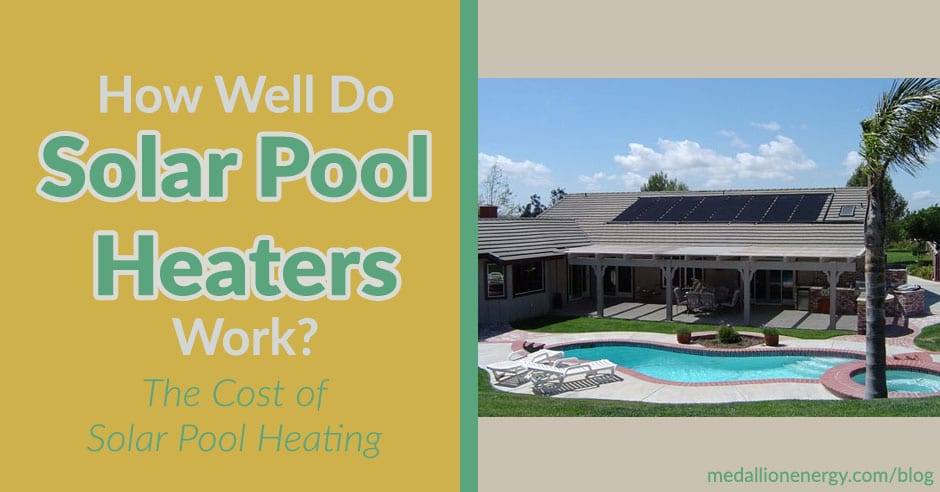Curious about the cost of solar pool heating? Want to know how well solar pool heaters work?
Uncover the answers in this post
If you’re reading this post, then you’re probably trying to weigh out the pros and cons of solar pool heaters. You might be thinking about installing a solar pool heating system in your pool, or you might be comparing them to other pool heaters.
Wherever you stand, this post will walk you through everything you need to know about solar pool heating. From the different types of heating systems and how they work to heating speed and installation costs.
As with any pool heater, solar pool heaters come with their own set of benefits and limitations that all pool owners should know about before making a decision. So if you’re looking to knock out of all of your solar pool heating research in one spot, you’ve come to the right place.
Keep reading to learn how well solar pool heaters work, how much they cost you, and more.
How Well Do Solar Pool Heaters Work? | The Cost Of Solar Pool Heaters
How do solar pool heaters work?
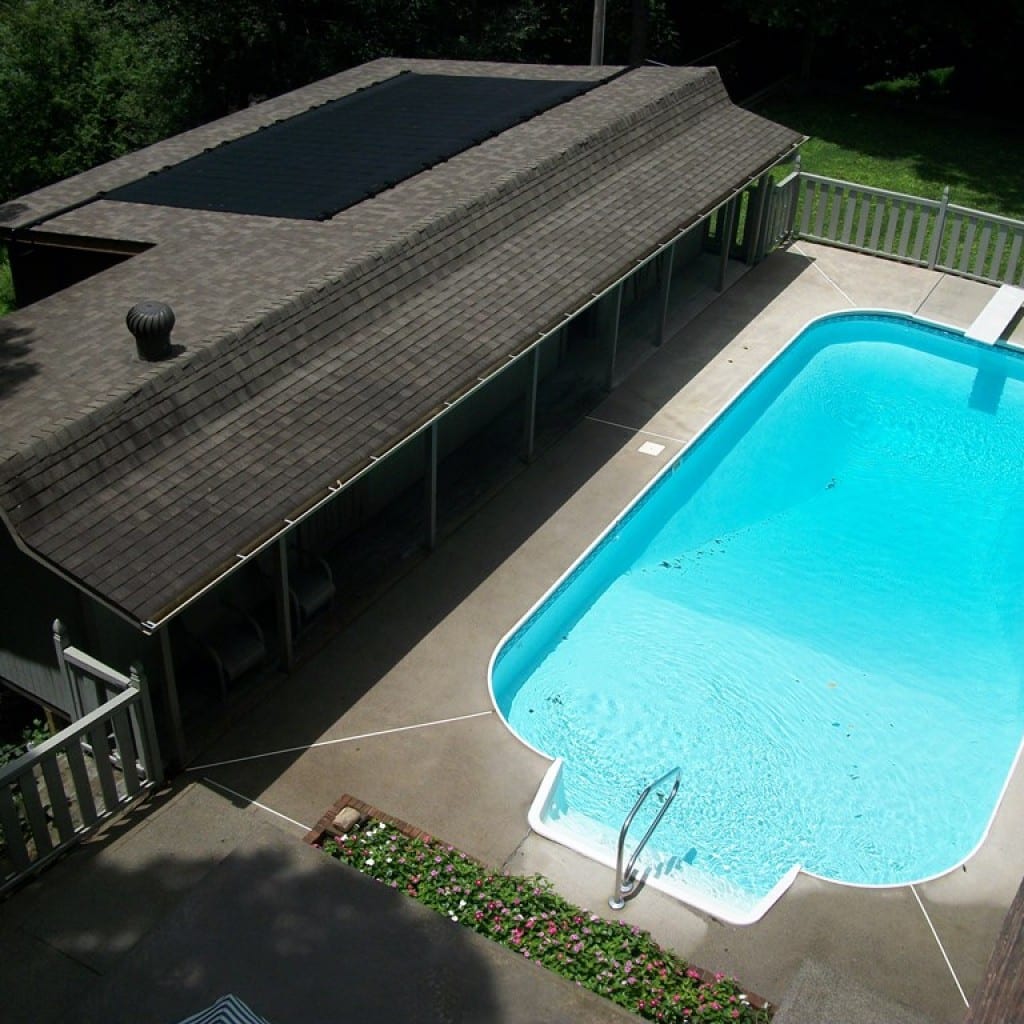
To answer this essential question, let’s first answer and even better one:
What is a solar pool heater?
Two major components comprise a solar pool heater: Solar heating panels & a swimming pool pump
Yup, just those two parts make up a “solar pool heater”. Unlike a pool heat pump or gas pool heater, a solar pool heater isn’t a physical heating unit, but instead two separate parts working as one. This is why they’re more commonly referred to as solar pool heating systems (a lot less confusing).
So now that we’ve properly defined a solar pool heater, let’s talk about how they work.
How solar pool heaters work:
- Pool pump sends water through the pipes to a diverter valve
- Diverter valve sends water up the pipe leading to the solar panels
- Solar panels are usually positioned on top of a roof, on fence,
or a ground-level platform facing the south
- Solar panels are usually positioned on top of a roof, on fence,
- Water slowly travels up through the panels, heating as it passes through
- Heated water travels down the panel’s outlet pipe
- A check valve, which prevents back cycling between cold and heated water,
directs warm water into the pool
What’s the cost of solar pool heating?
Here’s the question nearly every pool owner wants to know the answer to right away.
Since a solar pool heater’s greatest selling point is “free heat”, it’s assumed that they’re relatively low cost. Although certainly a cost-effective option, there are a few important factors to consider regarding the overall cost of solar heating on both a short term and long term scale.
How much does a solar pool heater cost to install?
Solar pool heating systems range in price from a low of $3,000 to a high of about $9,000. That said, the average cost a solar pool heater installation falls in the $5,000 range.
The price of installation is based on a few factors, including:
- The size of your pool
- The type of panels you purchase
- Your available sun exposure
- The amount of additional work needed for installation
That gives you a good idea of how much it’ll cost to install a solar pool heating system, but you’re probably still wondering:
How much does it cost to heat pool with a solar pool heater?
Although the solar heat your panels harvest will certainly be free of charge, the electricity you need to pump water through your system isn’t. In order to warm your water, you need to make sure it can travel through the solar panels.
So expect to spend anywhere from $50 to $200 each month on electricity for powering your solar pool heating system (the filter pump).
Related: 7 Best Ways To Lower Your Swimming Pool Bills By Up To 50%
What are the different types of solar pool heaters?
There are two main types of solar pool heating systems:
Propylene mats
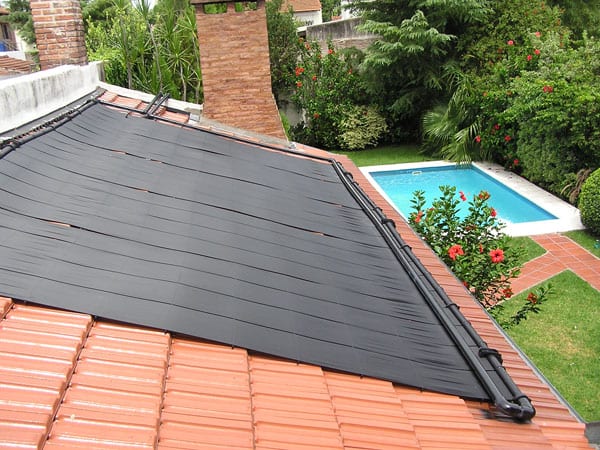
These are the more economical option. Propylene solar pool heating systems consist of a series of thin mats, each containing small veins or tubes within. Water travels through these veins as it flows through the mats.
Two PVC pipes hold the mat together — one on top and one on bottom — through which water enters and exits the solar array.
Glazed solar panels
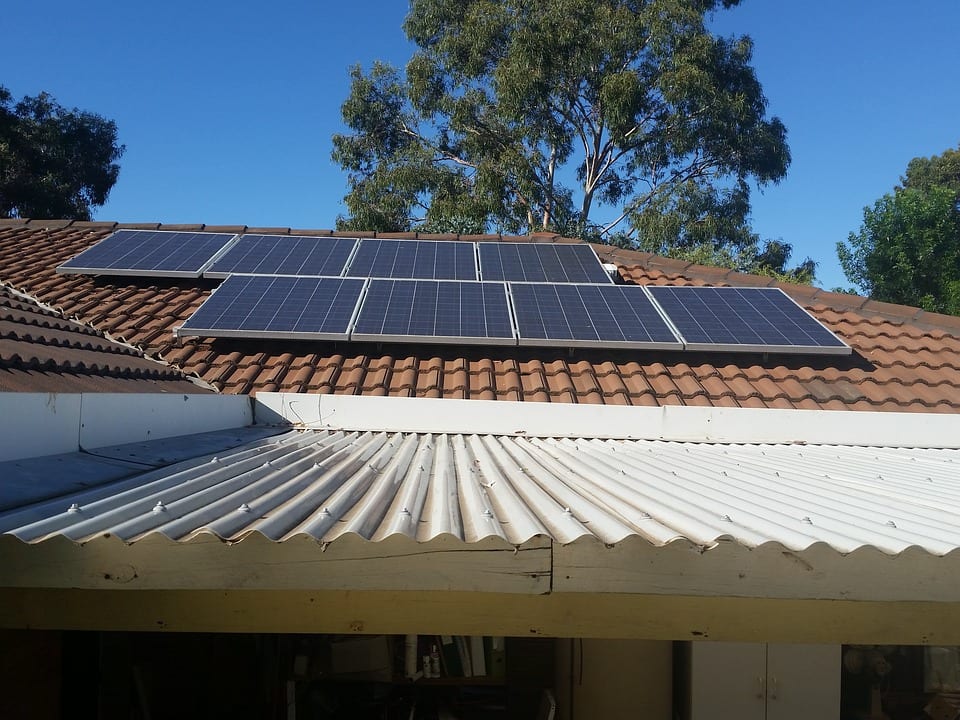
Glazed solar panels serve as the more durable and effective solar heat collectors. The panels consist of a solid aluminum frame which houses two layers of heat tempered solar glass. Within the glass layers lies a series of copper pipes for pool water to travel through.
These panels offer superior heat transfer, but also come with a much heftier price tag.
How long does it take to heat a pool with solar panels?
During warmer weather with hours of consistent sunlight, solar panels can heat a pool to a comfortable temperature within a day or so. That said they do it the slowest out of all pool heaters, at a maximum rate of about 5-7 degrees within a full day.
Other important factors that affect heating speed include the size of your pool and sun exposure.
Since solar heaters rely exclusively upon the sun, their heating rate fluctuates greatly:
On a cloudy day with spots of sunshine, you might only heat your pool 2 or 3 degrees after running the pump all day. And that’s hardly enough for a comfortable swim.
If the weather’s cold, heat transfer becomes even less effective. In fact, if it’s too cloudy, a solar pool heater can actually make the water colder. And that only makes it harder to warm up the next day.
Point being, constant solar exposure is a necessity if you want to heat your pool at a decent rate.
How warm does a solar heated pool get?

As warm as outdoor temperatures and the sunshine let it. That would be the short answer.
Of course, as you know, a solar pool heating system’s heating ability is controlled by sunlight. So a good rule of thumb is that with solar heating, you can usually warm your pool a good 5-10 degrees hotter than the current outdoor temperature.
But naturally, factors like your pool’s current temperature, the time of year, and whether or not you use a cover have a major effect.
Do solar pool covers really work?
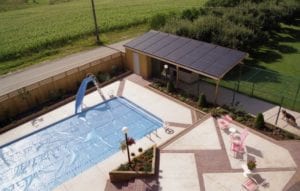 Yes. Using a solar pool cover is an excellent decision whether you’re heating your pool with a heat pump or solar pool heater.
Yes. Using a solar pool cover is an excellent decision whether you’re heating your pool with a heat pump or solar pool heater.
With a solar cover, you can reduce heat loss by 75%, which improves your pool’s ability to retain heat. This not only saves you money but also reduces how much you need to run the heater.
With that said, on a warm sunny day, a solar heated pool can warm up to temperatures ranging from around 75 degrees to a high of about 85.
Related: How To Use a Solar Cover
Does solar pool heating work in the winter?
No, unless you live in a place with sunnier weather year-round like Florida, California, or Arizona. With that said, it’s important to remember that outdoor temperatures still have a major effect on how well solar pool heaters work.
Even in places like Florida and Cali, during certain times, temperatures can still drop down to the low fifties. At this point, a solar pool heater is no longer effective, and wouldn’t be able to heat long enough, or warm enough for a comfortable swim.
On the flip side, a heat pump pool heater in this situation would still be able to warm up your pool whether the sun was out or not.
So when you consider the issues of low temperature and limited sun exposure, it’s easy to see why many pool owners use solar pool heaters as back-up to more on-demand heating systems like gas heaters or pool heat pumps (which can heat your pool at outdoor temperatures of 30 degrees).
Related: 7 Ways To Extend Your Pool Season By Up To 6 Months
DIY Solar Pool Heating: Solar Pool Heater Do It Yourself
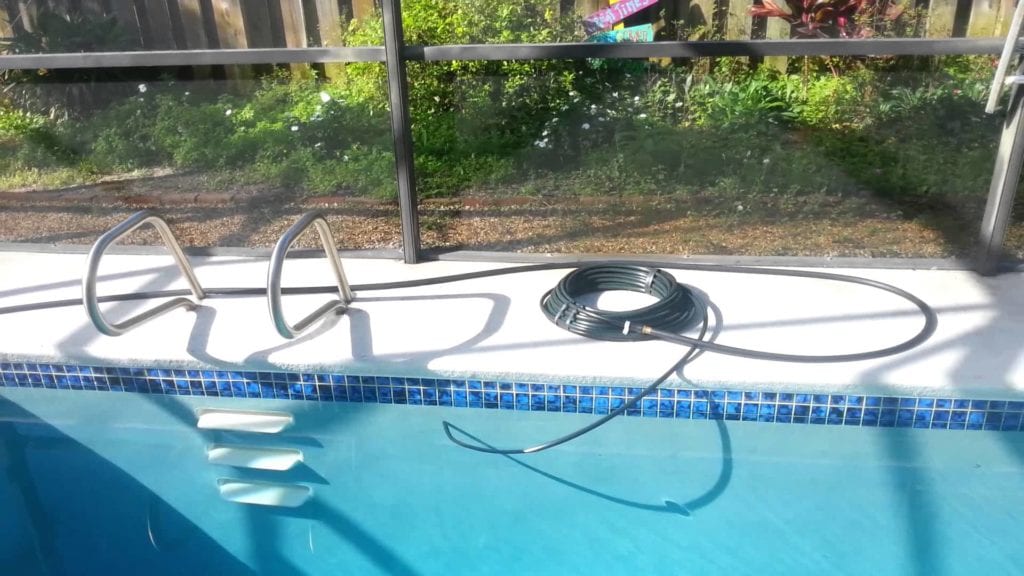
Want to experiment with solar pool heating but don’t want to commit to installing a system?
Not a problem! You can make your own DIY solar pool heater in the meantime.
All you need is a black garden hose, a place to put it, water, and sunlight
You can find the full directions in this post: 7 Cheap Ways To Heat Your Pool
Solar Pool Heater Advantages
- Solar pool heaters are low maintenance
- Since there aren’t a lot of parts, solar pool heating systems are easier to maintain. You either replace the panels or the pump
- With constant sunlight, solar pool heaters can heat your pool by up to 7 degrees
- For those with plenty of sunlight and warm weather, solar heaters offer an affordable and eco-friendly pool heating alternative.
- Can be controlled with automatic diverter valves
- While every solar pool heating system includes a manual diverter valve for managing water flow, automatic valves are an upgrade. Automatic diverter valves use sensors to detect temperature and automatically direct water to, or away from your solar panels
- Can slightly cool water at night
- If the pool gets too hot during the day, running the solar heater at night can help cool the water. At night, as water travels through the panels, it slightly cools down before flowing back into the pool
Solar Pool Heater Disadvantages
- Solar pool heating takes a long time to heat up
- If you’re looking for a fast pool heating up option, then solar pool heaters are not for you.
- Even with consistent sunlight, these solar pool heating systems can only heat your water by a few degrees each day. And chances are you won’t always have a full day of sunlight every time you want to swim, which can slow things down more.
- Only works well on bright sunny days
- Going back to the main question: Solar heaters work great, as long as they’re used how they’re meant to be: to heat up your pool on a warm day with plenty of sunlight.
- Without steady sunlight, solar panels have no other way of reliably sourcing heat
- Isn’t free: Still incurs cost of running pump
- Despite being marketed as “free heating” solar pool heaters still incur the cost of electricity for running the pump/powering the system
- Solar panels take up a lot of space
- For an effective solar pool heating system, you need a total amount of solar panels equal to half the size of your pool.
- If you own a 16 x 32 pool, then you would need 8 x 16 feet worth of panels, placed somewhere with direct sunlight.
Solar pool heating systems, are they right for you?
For pool owners in warmer climates looking to enjoy a few comfortable swims throughout the pool season, a solar pool heater can be a great heating option. With the limitations and cost of solar pool heating considered, as long as the sun’s out and the weather is decent, solar pool heaters can provide the heat you need to swim comfortably.
But for pool owners who want to extend their pool season, heat their water fast, and be able to swim regardless of the temperature, solar pool heaters are better suited as alternatives. For consistent on-demand heating, consider other options like pool heat pumps or gas pool heaters.
If you liked this post you might also like:
- 7 Cheap Ways To Heat Your Pool
- Pool Heat Pumps vs Solar Pool Heaters
- Do You Need a Pool Heater In Florida
